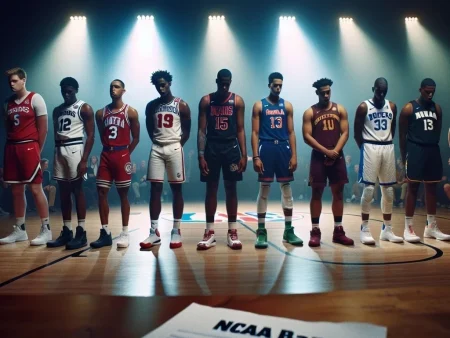Discover how New Jersey plans to curb gambling ads during live sports broadcasts. Explore the impact of sports betting ads and the state’s regulatory response.
New Jersey Considers Tougher Regulations on Gambling Ads During Live Sports Telecasts
Wellcome Offer:
200% up to $2,000
+ 100 Free Spins
The winnings from your free spins will be credited as bonus funds. Exclusively available for new players with fair wagering requirements.
Wellcome Offer:
250% Bonus up to $5,000
+ 100 Free Spins
Claim your bonus and spin your way to big wins! Minimum deposit of $20 required. Wagering requirements apply. Bonus valid for 30 days.
Get up to:
100% up to $1,000
+ 300 Free Spins
You need to deposit at least $25 to be eligible for this bonus. The maximum amount of money you can withdraw from this bonus is limited to $20,000 or 10-times.
Welcome Package:
500% up to $5,000
+ 250% on your 2nd and 3rd deposits
This welcome package rewards new players across their first three deposits. A minimum deposit of $25 applies, with a wagering requirement of 60x before withdrawals.
Wellcome Offer:
250% up to $1,500
+ 100 free spins
Whether you prefer generous deposit bonuses or a bundle of free spins, Cafe Casino’s welcome offer has everything you need to enhance your gaming adventure.
Wellcome Offer:
500% bonus up to $7,500
+ 150 free spins
If you're after big deposit bonuses or a load of free spins, Ducky Luck Casino’s welcome package sets the stage for an exciting gaming adventure.
Welcome Offer:
200% up to $2,000
+ 100 Free Spins
This welcome package combines a deposit match with free spins, giving new players a powerful way to kick off their VoltageBet journey.
Wellcome Offer:
200% up to $1,000
+ 30 free spins
Lovers of slot games and those looking to boost their deposit will find Slots LV Casino’s welcome offer the perfect way to jumpstart their gaming journey.
Wellcome Offer:
200% up to $500
+ Free Spins
Terms typically include standard wagering requirements and a limited validity period. Offers vary by deposit method and player eligibility.
Wellcome Offer:
250% up to $1,500
+ 50 Free Spins
All winnings from free spins are credited as bonus funds, with fair wagering requirements. Exclusive to new players.
In recent years, the rise of sports betting has been accompanied by a surge in advertisements promoting gambling․ As a result, there is growing concern about the impact of these ads on consumers, particularly during live telecasts of sports events․ In response, New Jersey is considering implementing tougher regulation to limit gambling ads during these broadcasts․
The Rise of Sports Betting in New Jersey
Since the legalization of sports betting in New Jersey, the gaming industry has seen significant growth․ This has led to increased marketing efforts by gambling companies, aiming to attract more bettors․ However, the proliferation of these ads, especially during live sports telecasts, has raised concerns about their influence on viewers․

Current Advertising Practices
Currently, gambling advertisements are a common sight during sports broadcasts․ These ads often highlight the thrill and potential financial gain of betting, which can be enticing to viewers․ However, critics argue that such promotions can be misleading and contribute to gambling addiction․
Potential Legislation and Restrictions
In light of these concerns, New Jersey lawmakers are exploring options to impose advertising limits on gambling during live sports telecasts․ Proposed legislation may include restrictions on the frequency and timing of ads, as well as requirements for clear messages about responsible gaming and consumer protection․
Consumer Protection and Responsible Gaming
One of the primary goals of these potential regulations is to enhance consumer protection․ By limiting exposure to gambling ads, especially during live sports broadcasts, regulators hope to reduce impulsive betting and promote responsible gaming practices among viewers․
Impact on the Gaming Industry
While these proposed changes aim to protect consumers, they may also affect the gaming industry’s marketing strategies․ Gambling companies may need to adapt their advertising approaches, balancing promotional efforts with the new regulatory landscape․
As New Jersey considers these tougher advertising limits, the debate over gambling ads during live sports telecasts continues․ It remains to be seen how these potential regulations will shape the future of sports betting advertising and consumer protection․ However, the focus on responsible gaming and consumer safety is a positive step towards a more balanced and regulated approach to gambling promotion․

























